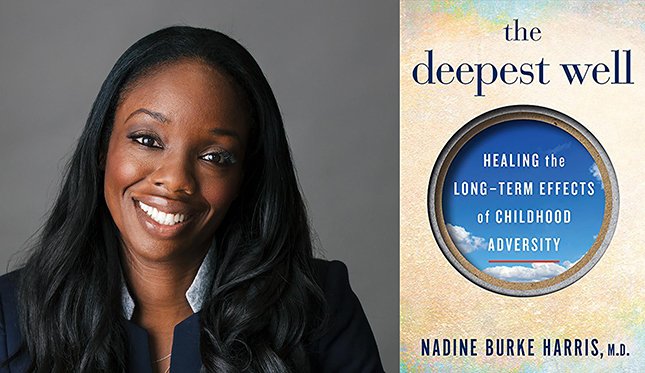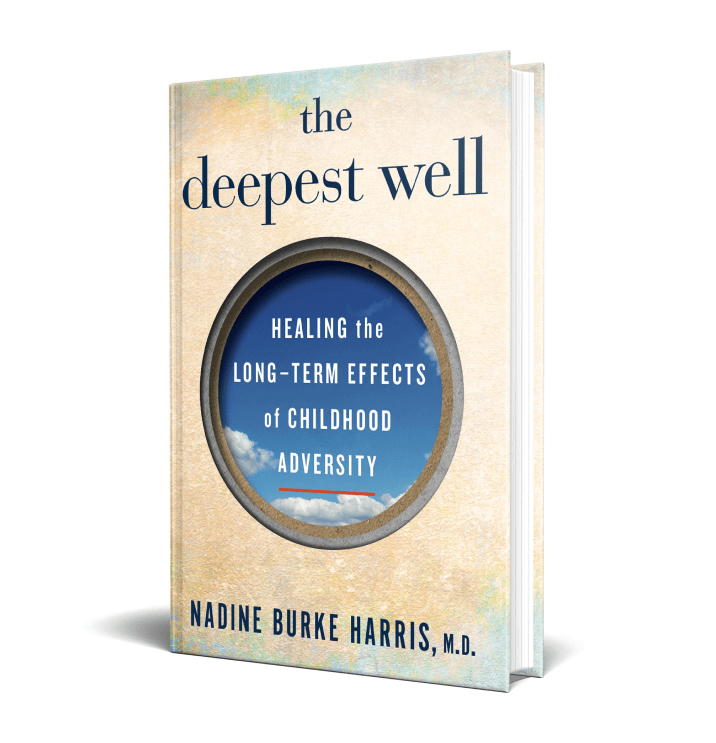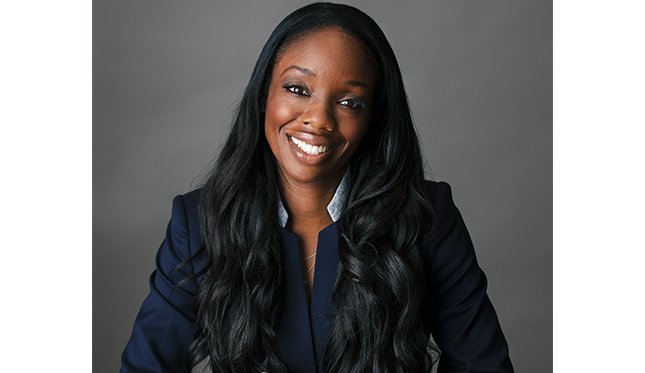San Francisco–based pediatrician Nadine Burke Harris has done extensive research on the link between childhood traumatic events and the increased risk of developing serious illnesses. Based on her findings, she founded San Francisco’s Center for Youth Wellness, an organization dedicated to treating children who are exposed to toxic stress. “The upshot is that it’s preventable,” says Burke Harris. “Parents and doctors need to be educated and take action by addressing toxic stress in children as a medical health issue and getting them the help and support they need early on.” Following a 2015 TED Talk on the topic, Burke Harris was inundated by people seeking resources and treatment, so she decided to write a book: The Deepest Well: Healing the Long-Term Effects of Childhood Adversity, released in January ($27, Houghton Mifflin Harcourt, 272 pages).
Burke Harris spoke with Worth about the inspiration behind the book and the awesome responsibility she feels to be a role model for her young patients, especially African American girls.

How has the Adverse Childhood Experience study informed your practice?
One of the first things I noticed when I launched a community pediatric clinic in San Francisco was the high rates of asthma and other illnesses a large number of my young patients were grappling with. I started looking for answers as to why so many of the kids I was treating were so sick. That’s when I came across the Adverse Childhood Experience study and learned that when kids are repeatedly exposed to traumatic events—things like abuse, neglect, parental addiction or mental illness and even divorce—it increases their risk of developing serious illnesses during childhood and later on in life. This phenomenon is called “toxic stress” and the reason why it affects children in particular is because their bodies are still developing.

Can you elaborate on the term “toxic stress”?
Toxic stress refers to the long-term changes to the body that can result from experiencing severely stressful events in childhood. To be clear, these experiences are traumatic, not rites of passage like a bad test score or losing a sports match. And toxic stress affects people from all walks of life, regardless of their race, income or geographic location. The research around toxic stress is backed by hard science, and it can seem daunting. But that’s why I founded the Center for Youth Wellness. It’s an organization dedicated to transforming pediatric medicine, raising public awareness and changing the way society responds to children exposed to the severely traumatic events that cause toxic stress.
Why did you decide to write The Deepest Well now?

In 2015, my talk for TEDMED launched on TED.com. In the months and years that have followed, I have been overwhelmed by the messages I receive daily from thousands of people, sharing their stories of childhood trauma and asking for help, which confirmed for me what a truly hidden crisis toxic stress is around the world. People ready for answers, treatment, resources—anything that would give them hope for a healthier and happier future. And they needed more information than a 16-minute TED Talk could provide. So I decided to write a book that would put the latest science and most promising interventions into the hands of the people so eager for answers.
“I won’t stop until every pediatric clinician in America is doing routine screening for Adverse Childhood Experiences.”
Here at Worth, we talk a lot about the status of women in finance. Do you think that medicine is a field in which women are on more equal footing with men than, say, in the finance industry?
I think women across all industries—including finance and medicine—have always faced many of the same challenges. From pay gaps and unfair leave policies to unequal treatment and harassment (or worse), many women are still dealing with vestiges of a bygone, male-dominated era.

What’s really special about being a pediatrician is that my young female patients get to see that a woman of color can go to medical school, become a doctor and work on something she feels passionate about. My focus is on treating my patients and helping them become healthy and happy adults, but it’s not lost on me that I’m also setting an example for the young people who come through my office.
What distinct challenges have you faced as a woman of color in your field?
There’s a lot of data that shows that female founders and founders of color receive less investment in their ideas than white men do. But my parents raised me to never back down from a challenge. I recognize that I might face additional challenges of bias and discrimination so I constantly over plan and over prepare to make sure I’m always ready for any additional scrutiny or doubt.
I also think that because I happen to be a woman of color, people often associate my work on toxic stress as only being concerned with communities of color. But the fact is that no family is immune to traumatic events. Like so many other conditions, toxic stress doesn’t have racial, gender or income barriers. In fact, I’m grateful to those like the friend I call “Caroline” in my book, for shedding light on the prevalence of trauma outside of communities of color—places where toxic stress often hides under shrouds of silence and secrecy.
What do you find most gratifying about the work that you do?
Every time I see a patient in my clinic doing so much better than they were when I first met them, I want to dance with happiness. Knowing that our work is making a difference for kids’ health and well-being is the most amazing feeling in the world. I’m so proud to be part of this national movement, to hear about how folks around the country are taking this information and changing how they support children. But the sweetest moments for me come from seeing my patients do better—seeing them thrive.
Now that your book is released, what’s next for you?
I won’t stop until every pediatric clinician in America is doing routine screening for ACEs. We know that early detection and intervention are the keys to seeing breakthrough change on this issue, and it’s time for us to be acting on this science. We’re building a community of medical practitioners who can work together to share knowledge, enhance capacity and shape research so that we can tackle the health effects of childhood trauma together as a field.
I also believe that knowledge gives people power…and hope. So we we’ve launched a national public education campaign called Stress Health to inform, engage and activate parents and caregivers around this critical issue.
For more information about the Center for Youth Wellness and to purchase Burke Harris’ book, The Deepest Well, visit centerforyouthwellness.org.









